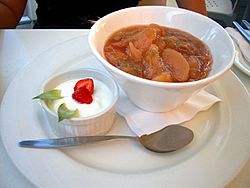Compote facts for kids

|
|
| Alternative names | compost (Middle English) |
|---|---|
| Type | Dessert |
| Serving temperature | Warm or chilled |
| Main ingredients | Fruit, sugar syrup, spices |
Compote (say "KOM-poht") is a yummy dessert that came from Europe a long, long time ago, in the Middle Ages. It's made by cooking whole or cut-up fruit in a sweet sugar syrup.
To make compote, fruits are cooked in water with sugar and spices. The sweet syrup can get extra flavor from things like vanilla, lemon or orange peel, cinnamon sticks, cloves, or even ground almonds. Sometimes, people add grated coconut, candied fruit, or raisins. You can enjoy compote warm or cold!
A Sweet History
Compote was popular in the Middle Ages because people believed that cooked fruit with sugar helped balance the body. The word "compote" comes from a Latin word, compositus, which means "mixture."
Long ago in England, compote was often served at the start of the last part of a big meal. During the time of the Renaissance, people started eating it chilled at the end of dinner. Compote was easy to make and used simple ingredients. It also didn't have any dairy, which made it a common food in Jewish homes across Europe. Today, in French, "compote" often means a smooth fruit purée (like applesauce) that usually doesn't have added sugar or fruit chunks.
Different Kinds of Compote
Many cultures, especially in Eastern Europe, use dried fruit to make compote. They also drink the sweet syrup as a tasty drink. Both the dessert and the drink are called kompot. In Mennonite culture, dried-fruit compote is known as pluma moos.
You can make compote even more special! People often top it with whipped cream, a sprinkle of cinnamon, or vanilla sugar. Sometimes, the syrup is made with wine, like in an old recipe for pear compote from the 1400s. Other ways to make compote include using dried fruit that has been soaked in water. You can even add a little bit of alcohol like kirsch, rum, or Frontignan for a grown-up version.
See also
 In Spanish: Compota para niños
In Spanish: Compota para niños
 | Jewel Prestage |
 | Ella Baker |
 | Fannie Lou Hamer |

